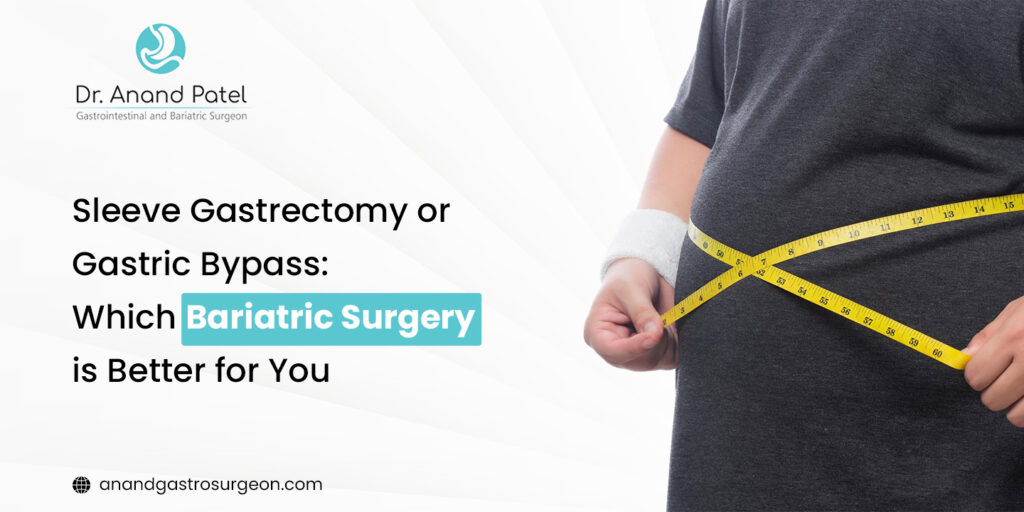
If you are struggling to maintain a healthy weight or suffer from some health conditions like obesity, you may need to think of weight loss surgery. Bariatric surgery is an effective procedure to lose weight. There are two most common procedures available: sleeve gastrectomy and gastric bypass. Both surgeries can reduce the stomach size and limit food intake. These can not only reduce weight but also reduce obesity-related health conditions like high blood pressure, high cholesterol, and diabetes. These procedures look similar but have some key differences in procedures, recovery and long-term outcomes. Let’s take a depth on which is the better procedure with a bariatric surgeon in Ahmedabad.
What is a sleeve gastrectomy?
Sleeve gastrectomy is a procedure in which surgeons can remove 80% of the size of the stomach and leave only a banana-shaped stomach that can hold one cup of food. This procedure can reduce the size of the appetite, leading to lower hunger hormone production of ghrelin, helping to feel full faster.
Pros of sleeve gastrectomy:
- This bariatric surgery is generally a more considerable and safest form of weight loss surgery compared to gastric bypass due to likely fewer problems during surgery or as recovery.
- This weight loss surgery doesn’t speed up digestion or the ability to absorb vitamins and minerals from the food, leading to less likely chances of complications of nausea, diarrhea, and malnutrition.
- People may lose 60-70% of weight loss after sleeve gastrectomy. It is most suitable for individuals with higher BMI and who previously had abdominal surgeries.
- Weight loss surgery may reduce the chances of obesity-related health conditions like sleep apnea, diabetes, liver disease, heart disease, stroke, some cancers, and infertility.
Cons of sleeve gastrectomy:
- This weight loss surgery can take a little longer time to achieve your weight loss target compared to gastric bypass.
- This procedure can cause acid reflux because it can increase the pressure on the lower esophageal sphincter, the ring of muscle that opens and closes the bottom of the esophagus.
- In this obesity surgery in Ahmedabad, most patients don’t experience long-term complications. Still, a large part of the stomach will be permanently removed, so one long-term risk includes gastroesophageal reflux disorder(GERD).
What is gastric bypass surgery?
Gastric bypass is the surgery that changes both your stomach and your digestive tract. To reduce your stomach, a bariatric surgeon in Ahmedabad can divide your stomach into two portions. They create a small egg-sized pouch at the top of the stomach and directly connect to the small intestine. The remaining size of the stomach may be bypassed and no longer used to digest the food. This bariatric surgery can change the layout of your intestine, where food enters the stomach, leading to reduced calories and nutrient absorption.
Pros of gastric bypass:
- This weight loss surgery reduces the amount of nutrients from the food; it leads to losing weight more quickly. People can reduce 70-80% of weight within a year through gastric bypass surgery.
- This bariatric surgery can improve obesity-related health conditions like type 2 diabetes, sleep apnea, and hypertension.
- Gastric bypass is a safer option if you have acid reflux and do not choose to go through with the sleeve gastrectomy. This obesity surgery in Ahmedabad has a longer proven track record with well-mounted results.
Cons of gastric bypass:
- Possibilities of facing dumping syndrome conditions like diarrhea, flushing nausea, vomiting, and lightheadedness in people with gastric bypass.
- After weight loss surgery, if patients do not get proper nutrients from food, then they need to take supplements of vitamins and minerals.
- Gastric bypass surgery is a more complex surgery with a slightly higher risk of complications, including leaks and infections.
- While complications aren’t common, they are possible. They include the chances of long-term complications such as increased sensitivity to alcohol, problems with nutrition, stomach ulcers, stomach perforation and bowel blockage.
Key differences between sleeve gastrectomy and gastric bypass surgery:
- Sleeve gastrectomy can remove 75-80% of the stomach permanently; no intestine rerouting. In contrast, gastric bypass surgery can create a small stomach pouch directly connected to a small intestine.
- Sleeve gastrectomy can reduce weight gradually and steadily, and gastric bypass can lose weight faster and usually causes total weight loss.
- Sleeve gastrectomy can reduce weight-related conditions like type 2 diabetes and sleep apnea but worsen acid reflux. On the other hand, gastric bypass can also reduce weight-related conditions and relieve acid reflux.
- Sleeve gastrectomy is simple, less invasive, and back to work more easily and quickly, while gastric bypass is complex surgery due to intestine rerouting, including long-term complications like dumping syndrome.
Which one is right for you?
Sleeve gastrectomy and gastric bypass, both obesity surgery in Ahmedabad, have some pros and cons. The decision of which is perfect for you is depends on some factors such as:
- Current health and BMI of the patient
- Patients suffer from obesity-related health conditions such as acid reflux or type 2 diabetes.
- Long-term weight loss goals
Consult a bariatric surgeon in Ahmedabad to discuss the right bariatric surgery in-depth and complete evaluation.
Summary:
Both sleeve gastrectomy and gastric bypass are effective weight loss surgeries for individuals who want to lose weight but cannot achieve it through diet and lifestyle modification. This is not a quick fix way, but with proper guidance, support, and lifestyle changes, both can help to live a happier, healthy life transformation. If you have any queries or need any guidance, consult our expert bariatric surgeon in Ahmedabad, Dr.Anand Patel, to take the right path in the journey of healthier.

